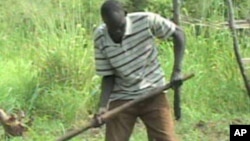WASHINGTON, D.C. —
South Sudan has enormous economic potential, with oil and water taking lead roles in the new nation's economic mix, but other resources also waiting in the wings, a U.S. based Sudan expert says.
"In the short term, oil is the life blood of the economy and of money the governments in both Khartoum and Juba rely on for all the activities of government," including paying their armed forces and civil servants, Alex de Waal, director of the Massachusetts-based World Peace Foundation, said.
"In the long term, South Sudan’s future depends on other resources that will be more valuable than the oil it has today," he added, referring in particular to its "extremely well-watered land, which makes for some of best farming land in the world, and for grazing cattle."
Eco-tourism is another untapped source of revenue for South Sudan, de Waal said. The newest nation in the world has "some of the most fantastic wildlife in the world" and could develop "vast game reserves, which could also be carbon sinks because the extent of the vegetation there is part of the lungs of the world."
But, in the immediate future, Juba has to work with Khartoum to resolve a dispute over oil, which has blocked South Sudanese exports of crude for more than a year.
South Sudan shut down its output of 350,000 barrels day in January last year in a row with Khartoum over pipeline fees. Oil is vital to both countries' beleaguered economies.
De Waal warned that if the dispute over oil transport between Juba and Khartoum continues, "... the coming year is going to be very, very tough" for South Sudan.
But, he added, the international community "is getting very frustrated with Khartoum, because it's Khartoum that's been blocking the resumption of the oil supply" and would likely intervene and help South Sudan "find an alternative pipeline to the Indian Ocean" and fund its construction.
Listen to the entire interview here:
"In the short term, oil is the life blood of the economy and of money the governments in both Khartoum and Juba rely on for all the activities of government," including paying their armed forces and civil servants, Alex de Waal, director of the Massachusetts-based World Peace Foundation, said.
"In the long term, South Sudan’s future depends on other resources that will be more valuable than the oil it has today," he added, referring in particular to its "extremely well-watered land, which makes for some of best farming land in the world, and for grazing cattle."
Eco-tourism is another untapped source of revenue for South Sudan, de Waal said. The newest nation in the world has "some of the most fantastic wildlife in the world" and could develop "vast game reserves, which could also be carbon sinks because the extent of the vegetation there is part of the lungs of the world."
But, in the immediate future, Juba has to work with Khartoum to resolve a dispute over oil, which has blocked South Sudanese exports of crude for more than a year.
South Sudan shut down its output of 350,000 barrels day in January last year in a row with Khartoum over pipeline fees. Oil is vital to both countries' beleaguered economies.
De Waal warned that if the dispute over oil transport between Juba and Khartoum continues, "... the coming year is going to be very, very tough" for South Sudan.
But, he added, the international community "is getting very frustrated with Khartoum, because it's Khartoum that's been blocking the resumption of the oil supply" and would likely intervene and help South Sudan "find an alternative pipeline to the Indian Ocean" and fund its construction.
Listen to the entire interview here:






